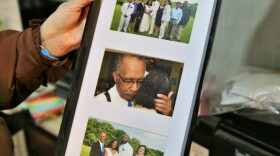
Sarah Boden
Sarah Boden covers health, science and technology for 90.5 WESA. Before coming to Pittsburgh in November 2017, she was a reporter for Iowa Public Radio where she covered a range of issues, including the 2016 Iowa Caucuses.
Sarah’s reporting has appeared on NPR’s Morning Edition, All Things Considered, Weekend Edition Saturday and WBUR's Here and Now. She has won multiple awards, including a regional Edward R. Murrow for her story on a legal challenge to Iowa's felon voting ban.
-
COVID continues to menace nursing homes across the US. In a new report, the CDC found just 4 out of 10 nursing home residents have gotten an updated COVID shot since last fall.
-
Monday's solar eclipse will give researchers another chance to study shadow bands, the thin wavy lines on the ground right before totality. They're hoping to crack a 200 year old mystery.
-
As billions from opioid settlements pour into states, Pennsylvania's efforts against addiction could be hamstrung because clean syringes could be considered illegal drug paraphernalia.
-
Pennsylvania is one of a dozen states where providing drug users with clean syringes to help prevent infection is not authorized. Now there's a push to change the state law.
-
A network of almost 1,400 federally-funded health clinics form an essential safety net for patients who have nowhere else to go. But even a temporary government shutdown could force cutbacks in care.
-
Federally funded health centers across the U.S. fear a government shutdown could further disrupt medical care for the uninsured and undocumented. They already face inflation and staffing challenges.
-
The Supreme Court delivered a historic victory to the anti-abortion movement. But many still feel their work is far from complete, and are seeking new strategies to stop abortion in all 50 states.
-
On the one-year anniversary of the Dobbs decision, many of the anti-abortion movement's most ardent supporters mark the occasion in Pittsburgh, Pa., with the National Right to Life.
-
Families can get blindsided by risky behavior with money, sometimes even before a diagnosis. Having tough conversations and setting up guardrails in advance can help prevent disaster.
-
Several nursing organizations are supportive of a bill in the Pennsylvania House that limits the number of hospitalized patients a registered nurse can care for at a given time.






